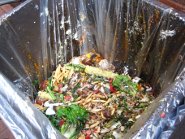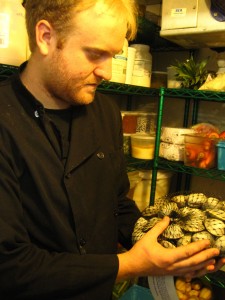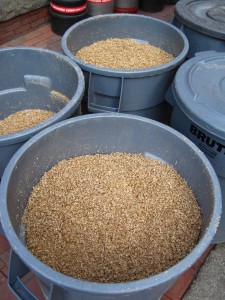
Digging Deep To Find Green Restaurants
With all the hype these days about “local”, “green” and “sustainable,” its often difficult for consumers to weed out the green-washing and dig deeper to find the real good guys. Often, simply changing out light bulbs (while an excellent effort) isn’t enough. Some companies are taking it the extra mile and finding creative ways to improve their sustainability on a holistic level—effecting not only their own business environment but also the practices of the vendors they work with.

Sous Chef John Gilman shows off Welfleet Littlenecks
Cambridge Brewing Company, a small in-house brewery, pub and restaurant in Kendall Square, is one of those companies. To further integrate sustainability into their business operations, Cambridge Brewing Company is working with the Sustainable Business Leader Program, a non-profit consulting service that works with local businesses to help green their operations. Through their work with SBLP, Cambridge Brewing Company has increased their composting efforts and is in the process of reducing their water consumption. They also make an effort to source much of their food locally, and now chef David Drew is taking it to the next level. Rather than asking his suppliers for specific foods he wants, he asks them what they have too much of. Recently Drew’s sous chef turned him on to Acadian Redfish. Says Drew, “These fish are a bycatch of a lot of the local haddock boats, meaning that both the haddock and redfish were going after the same bait and coming up in the nets. We learned that a lot of this redfish wasn’t being put to good use. Through our seafood purveyor we were able to get these redfish cleaned up for us. We put them on our menu for the summer in a fish taco dish and they were a huge success. One of our biggest sellers!”

Cambridge Brewing Company also composts all of their spent grain and food waste
By purchasing a food source that was abundantly available yet not in demand, Cambridge Brewing Company acted not only in the interests of their customers, but also their vendors. They forged a stronger bond with their fish purveyor, and they’ve continued to pursue this method of purchasing with their other vendors, helping to promote a sustainable local food market. Says Drew, “The people we use now are in this business because it’s what they love to do. They have personalities and histories and stories and when you call to place an order, you get to talk to a real person! These are community people who happen to be in the business of providing food for us. It takes a little extra effort to go out and find the local guys…the farmers, fishermen, honey guy, pickle guy, etc. But it’s so worth it.”
The number of farms in Massachusetts increased by 27 percent with 1,616 more farms since 2002, and farmland has finally stabilized with only 1/7 of 1 percent of farmland acres lost, according to the 2007 Census of Agriculture. While consumers can help their local farms by buying from farmers markets, they can also show their commitment to a sustainable food economy by supporting restaurants that source as locally (and sustainably) as possible. And as the demand for this quality of food grows, so will those farms.

Other local favorites include Veggie Planet & Henerietta’s Table. See also the Green Restaurant Association and Edible Boston.